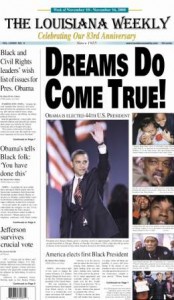To Endorse or Not to Endorse? That is the Question
Posted on December 17, 2012 in Endorsements, UncategorizedAs the race for the presidency winds down we have and will continue to see more endorsements for a presidential candidate. Just last week Colin Powell endorsed Obama. But what significance do these endorsements hold, especially more now that the election is only one week away? While these endorsements are legitimate and have an impact I think it is more so to affirm the decisions voters have already made. These public figures serve as role models to the general public. By making a decision and having it affirmed by someone you look up to is a comforting feeling. If a person you admire endorses someone else you can always move to the next without hesitation. Apart from the – what I would say – lack of influence on the decision the language endorsements use is interesting especially toward this election.
In the LA Times, references to the Bush administration go nowhere near unnoticeable. With phrases such as “misguided adventure” and referring to opponents as assailants, the rhetoric is by no means subtle to the watchful eye. While an endorsement is obviously partisan, the language is accusatory and set out to attack. But passive-aggressively. Apart from being accusatory toward the beginning of the piece, it also concludes with an accusatory line besides the usual “we urge you to reelect Obama.” They state, “The alternative offered by Romney would neglect the country’s infrastructure and human resources for the sake of yet another tax cut and a larger defense budget than even the Pentagon is seeking.” By bringing in the Pentagon, images of the 9/11 attacks still haunt the public. By using such images, the LA Times equates Romney to these attacks on America. This was prevalent throughout the entire article. Therefore, it is easy to state that the LA Times focused more on crating a negative image out of Romney, than a positive one of Obama.
The Des Moines Register on the other hand focused on how they believed Romney would be able to address, what they labeled, the most important issue of this election: the economy. It focuses on the business successes of Romney and how they would reflect his successes in the economy. They site his experience. the structure also differs from the times, as it seems to be more of a conversation with Romney getting the last word. By structuring as such there is better portrayal of the newspaper as a subject that was not taken lightly (as it should be portayed). But to conclude, the Register did what I found to be very interesting and a method to disqualify themselves as a partisan newspaper. They listed all the previous endorsements – which include both GOP and Democrat) and whether those endorsed won.
What we receive from both sources are different approaches. One is more lingering on the past and mentions of the future, while the other is more on the now and the future. Whatever the case, the newspapers took their stance and lived with their failed or successful endorsement.







